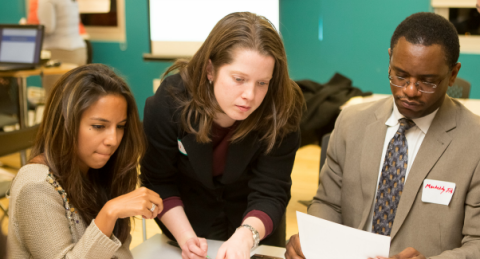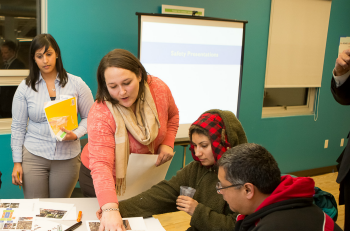Image

Ann Houston, Executive Director, The Neighborhood Developers
Challenge: Chelsea is the smallest city in Massachusetts, and the second most densely populated. Poverty rates are high, and the crime rates make it one of the state’s most dangerous places to live. Reducing those rates was essential to revitalizing the city.
Chelsea is the smallest and most densely populated city in Massachusetts, with 36,000 residents occupying 1.8 square miles. Forty-seven percent of residents are foreign born, poverty rates are high, and the crime rates make it one of the most dangerous cities in the state. Reducing crime is key to revitalizing Chelsea, and the nonprofit Neighborhood Developers (TND) set an ambitious goal for cutting the crime rate by 30 percent over 10 years.
In 1991, rampant corruption and near fiscal collapse led the state to step in and place Chelsea into receivership. The state-led intervention led to a new city charter that adopted a city manager and city council system. Many in Chelsea point to the city’s emergence from receivership in 1995 as the time when things began to turn around.
And yet as the years passed, it became clear that there were still difficult times ahead. Even with more efficient and accountable governance, the city faced a long road back to fiscal strength, especially as it was handicapped by low bond ratings, a weak housing market and declining industry.
In 2009, TND and the City of Chelsea -- with funding from NeighborWorks America -- co-sponsored a community planning process to develop a plan. For six months, over 100 residents worked with us to craft an action plan for a three-block area hit hard by foreclosures. The three-year plan allocated resources to help with traffic, garbage, parking, forecloses, public parks and policing.
In 2013, after success with the small project, the city and TND led a second planning process centered on downtown Chelsea, this time with 18 stakeholders. It was called Chelsea Thrives.
Initially, Chelsea Thrives had a broad scope that sought to engage residents, businesses, nonprofits and municipal leaders on a number of issues. A year in, we determined the scope was too broad, diffusing impact and partner participation. We tightened our group of partners and zeroed in on one main priority: Crime.
Chelsea Thrives seeks to empower 400 residents and 45 institutions to manage and deploy resources that address the following drivers of crime:
- High incidence of substance abuse and trauma
- An isolated and disengaged population that under-reports crime
- Poor physical environments, such as downtown Chelsea
- Insufficient youth programming
 The city has provided new resources where the community says it needs it. For example, it now funds two “community navigators” to provide mental health and substance abuse services to individuals on the streets. This frees police for other work. The city has also provided resources for drug abuse treatment.
The city has provided new resources where the community says it needs it. For example, it now funds two “community navigators” to provide mental health and substance abuse services to individuals on the streets. This frees police for other work. The city has also provided resources for drug abuse treatment.One of the most exciting results of Chelsea Thrives is called The Hub. Chelsea is the first U.S. city to replicate this successful Canadian crime-prevention model. It’s a weekly roundtable of 34 public and private sector agencies that identifies families in crisis, and tries to arrange the resources those families need to navigate their difficult situations. Within 48 hours, outreach is made to the family with an offer of coordinated services.
Maria Godoy with the state’s Department of Children and Families describes her experience with The Hub as “absolutely incredible.” She reports that: “Interventions happen quicker and access to services is faster.” Since its launch in mid-2015, just under 100 cases have come before The Hub. TND now analyzes and presents Hub data on a quarterly basis in support of shared learning.
Resident leaders are also deeply integrated into our program. Some attend monthly meetings to point out crime hotspots to the city. Some take part in crime watches and cleanups. And some are members of a task force that will soon make policy recommendations to the city about youth programming.
For TND, the launch of Chelsea Thrives has increased our capacity to manage a broad and complex initiative with many partners, something we hope to build on as we continue to nurture community development in Chelsea and the surrounding area.

